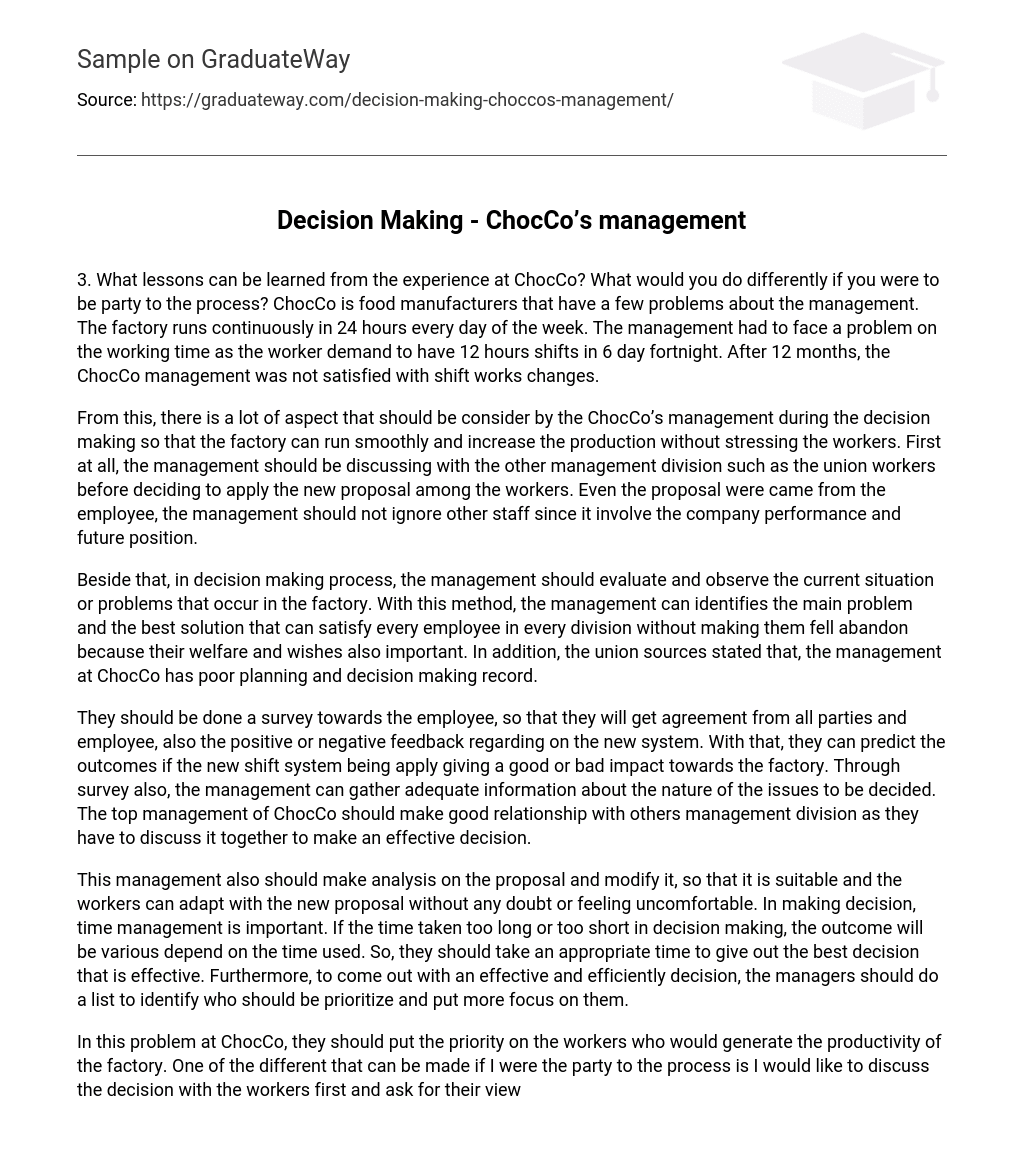3. What can be gleaned from the ChocCo experience and how would you handle it differently? ChocCo, a food manufacturer grappling with management problems, operates around the clock. The management had to tackle worker requests for 12-hour shifts in a 6-day period every two weeks. Nonetheless, after one year, the ChocCo management expressed dissatisfaction with the alterations made to shift work.
In order to ensure smooth operation and increased production of the factory without causing stress to workers, ChocCo’s management must consider multiple aspects when making decisions. This includes engaging in discussions with various management divisions, including union workers, before implementing any new proposals among employees. It is crucial for the management not to disregard input from other staff members, regardless of whether the proposal originates from an employee, as it directly affects the company’s performance and future position.
In order to make decisions, it is crucial for management to evaluate the present state and problems within the factory. This enables them to pinpoint the primary issue and discover a solution that caters to all divisions’ employees, while also considering their well-being and preferences. The union sources have additionally condemned ChocCo’s management for their inadequate planning and decision-making history.
To ensure agreement and feedback on the new system, it is advised to conduct a survey among employees. This survey will help assess both the positive and negative potential impact of the new shift system on the factory. Furthermore, it will provide management with adequate information regarding relevant issues. Building strong relationships with other management divisions is crucial for top management at ChocCo to make effective decisions.
The management needs to evaluate and modify the proposal to ensure it is worker-friendly and easily implementable. Timely decision-making is crucial as the outcome depends on the allocated time. Hence, it is important to allocate an appropriate amount of time for ensuring efficient decision-making process. Moreover, managers should prioritize individuals and give them more attention in order to make effective decisions.
ChocCo values the workers who contribute to its productivity and prioritizes their well-being. If I were involved in decision-making, I would hold a discussion with the workers regarding changing the shift duration from 8 hours to 12 hours. This open dialogue will provide valuable insight into their reactions and thoughts on this proposed change. Additionally, we can collaboratively explore the benefits and drawbacks of implementing this shift change, involving all relevant parties.
Moreover, when discussing potential trials, it is possible to avoid any arising crisis. Additionally, I aim to make a decision that enhances productivity without burdening employees. Employees generate income for ChocCo and their well-being is important to top management. As part of the company, I encourage employees to increase their productivity and contribute to the economy of ChocCo. A productive employee automatically benefits ChocCo.
The top management should avoid overloading their employees as it can impact their productivity. Additionally, I have decided against continuing with the 12-hour shift when employees are experiencing excessive fatigue, stress, and accidents. Despite receiving a negative response from employees about the shift change, I will remain firm in my decision and provide them with an understanding of the consequences of continuing the 12-hour shift. Moreover, I will emphasize this decision to other stakeholders and engage in further discussion to obtain their agreement as well.
I propose implementing an 8-hour shift as a way to enhance employee efficiency. Additionally, as the top manager of ChocCo, I believe it is important to offer incentives to employees in order to encourage them to continue working the 8-hour shift. This will demonstrate to them that they are valued assets within our factory. Consequently, rewarding employees can motivate them to stay at their jobs, even if their requests have not been fulfilled by the management.





